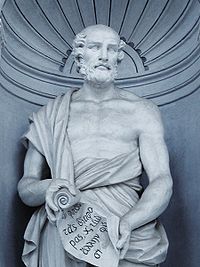The book begins with a historical perspective of plant diseases. Around 300 B.C.E. the philosopher Theophrastus, known to many as the father of botany, 'recognized that wild trees were not liable to the ravages of disease, whereas cultivated plants were subject to an array of devastating diseases.' This seems very interesting to me. Since ancient times humans have, with the best intentions, been trying to grow plants, but missing the big picture when caring for them in the landscape. The battles of poor cultural management we arborists fight on a daily basis, have probably been taking place for eons! Imagine mulch volcanoes on olive trees planted around the Acropolis.
Another thought; we are members of a global economy. Because of shipping and imports, numerous tree diseases and pests have been introduced to the US. Around the time of Theophrastus Greece was the center of a global economy. One may wonder how many of the diseases ravaging the urban trees of Ancient Greece were introduced from afar.
 |
| Theophrastus, the father of botany. Pic borrowed from Wikipedia (you should donate to Wikipedia) |
No comments:
Post a Comment